Gardeners North West London: Cultivating Beautiful Spaces
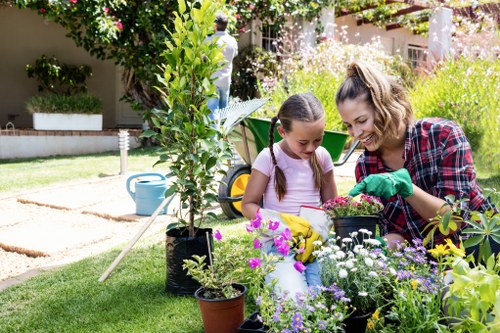
Introduction to Gardening in North West London
North West London is renowned for its stunning residential areas, vibrant communities, and lush green spaces. Gardening in this region offers a unique opportunity to create beautiful and sustainable outdoor environments. Whether you are a seasoned gardener or a beginner, understanding the local climate, soil conditions, and plant varieties is essential to cultivating a thriving garden.
The role of gardeners in North West London goes beyond mere plant cultivation. They contribute to the aesthetic appeal of homes, provide environmental benefits, and create tranquil spaces for relaxation and enjoyment. With the right knowledge and resources, anyone can transform their garden into a personal oasis.
In this article, we will explore the key aspects of gardening in North West London, including essential tips, popular plants, and the best practices to ensure your garden flourishes all year round.
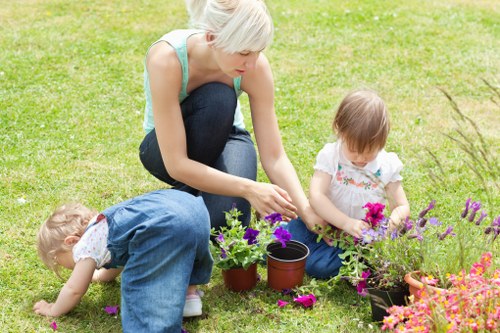
Understanding North West London's Climate and Soil
Climate Considerations
North West London enjoys a temperate maritime climate, characterized by mild winters and warm summers. This climate is conducive to a wide variety of plants, making gardening an enjoyable activity throughout the year. However, gardeners must be mindful of occasional frost in the colder months and ensure that their plants are protected from extreme weather conditions.
Rainfall is fairly evenly distributed throughout the year, but certain periods may experience heavier showers. Proper drainage is crucial to prevent waterlogging, which can damage plants and lead to root diseases. Utilizing raised beds and well-draining soil mixes can help mitigate these issues.
Sunlight is another critical factor to consider. Most vegetables and flowering plants thrive in full sun, requiring at least six hours of direct sunlight daily. Understanding the sunlight patterns in your garden can help you select the appropriate plants and optimize their growth.
- Temperature ranges: Mild winters and warm summers
- Average annual rainfall: 600-700mm
- Sunlight: 6+ hours of direct sunlight for most plants
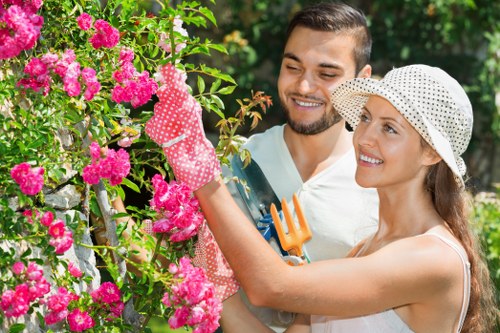
Essential Gardening Tools for North West London Gardeners
Basic Tools Every Gardener Needs
Having the right tools is fundamental to successful gardening. North West London gardeners should equip themselves with a range of essential tools to handle various gardening tasks efficiently.
Some of the must-have tools include:
- Pruning shears: Ideal for trimming and shaping plants.
- Spade: Necessary for digging and turning soil.
- Garden fork: Useful for aerating the soil and removing weeds.
- Watering can or hose: Essential for providing adequate moisture to plants.
- Gloves: Protect hands from thorns, dirt, and potential injuries.
Advanced Tools for the Avid Gardener
For those who are more experienced or have larger gardens, additional tools can enhance efficiency and effectiveness.
- Loppers: For cutting thicker branches.
- Wheelbarrow: Useful for transporting soil, compost, and plants.
- Seed spreader: Facilitates even distribution of seeds.
- Garden tiller: Helps in preparing large areas of soil for planting.
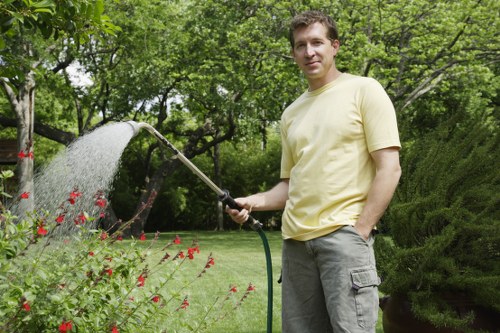
Popular Plants for North West London Gardens
Flowers and Ornamentals
Choosing the right plants can significantly enhance the beauty of your garden. North West London’s climate supports a diverse range of flowers and ornamental plants.
- Roses: Classic and versatile, roses are a favorite for their fragrance and variety.
- Lavender: Known for its soothing scent and vibrant purple flowers.
- Hydrangeas: Offer large, colorful blooms that add elegance to any garden.
- Hostas: Ideal for shaded areas, providing lush foliage.
- Geraniums: Bright and hardy, perfect for adding pops of color.
Vegetables and Herbs
For those interested in growing their own food, North West London is suitable for a variety of vegetables and herbs.
- Tomatoes: Thrive in warm, sunny spots.
- Carrots: Require loose, well-draining soil.
- Basil: A fragrant herb that pairs well with many dishes.
- Spinach: Grows quickly and is rich in nutrients.
- Peppers: Add color and heat to gardens and meals.
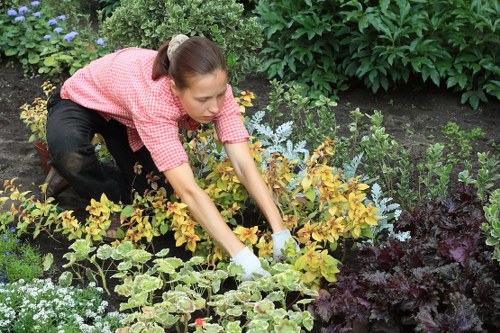
Best Practices for Sustainable Gardening
Soil Health and Composting
Maintaining healthy soil is the foundation of a thriving garden. Regularly adding compost enhances soil fertility, structure, and moisture retention. Composting also reduces waste by recycling kitchen scraps and garden clippings.
- Start a compost bin and add organic materials like vegetable scraps, leaves, and grass clippings.
- Turn the compost regularly to aerate and speed up decomposition.
- Use the finished compost to enrich garden beds and improve soil quality.
Water Conservation Techniques
Watering efficiently is crucial, especially during dry spells. Implementing water conservation techniques can help maintain a healthy garden while minimizing water usage.
- Mulching: Apply a layer of mulch to retain soil moisture and suppress weeds.
- Drip irrigation: Delivers water directly to plant roots, reducing evaporation.
- Rain barrels: Collect and store rainwater for later use in watering plants.
Integrated Pest Management
Managing pests sustainably involves using a combination of methods to control unwanted insects and diseases without relying heavily on chemicals.
- Encourage beneficial insects like ladybugs and bees.
- Use natural remedies such as neem oil or insecticidal soap.
- Rotate crops to prevent the buildup of pests and diseases.
Gardening Services in North West London
For those who prefer professional assistance, there are numerous gardening services available in North West London. These services range from regular maintenance and landscaping to bespoke garden designs tailored to individual preferences.
Professional gardeners can help you:
- Design and plan your garden layout.
- Install irrigation systems and lighting.
- Provide expert advice on plant selection and care.
- Maintain your garden with mowing, pruning, and weeding services.
- Implement sustainable practices to enhance your garden’s eco-friendliness.
Choosing the Right Gardening Service
When selecting a gardening service, consider the following factors:
- Experience: Look for services with a proven track record in North West London.
- Services Offered: Ensure they provide the specific services you need.
- Reputation: Check reviews and testimonials from previous clients.
- Pricing: Compare quotes to find a service that fits your budget.
- Sustainability: Opt for services that prioritize eco-friendly practices.
Community and Gardening Groups in North West London
Joining local gardening groups and communities can enhance your gardening experience. These groups provide support, resources, and opportunities to connect with fellow gardeners.
- Local Garden Clubs: Participate in meetings, workshops, and community projects.
- Online Forums: Share tips, seek advice, and showcase your garden online.
- Workshops and Events: Attend gardening demonstrations and educational sessions.
- Community Gardens: Collaborate with others to maintain shared garden spaces.
Engaging with the gardening community not only improves your skills but also fosters a sense of belonging and mutual support.
Benefits of Community Involvement
- Access to collective knowledge and experience.
- Opportunities for social interaction and networking.
- Participation in local green initiatives and projects.
- Exchange of plants, seeds, and gardening resources.
Gardening Trends in North West London
Gardening trends in North West London reflect both traditional practices and innovative approaches to creating modern, sustainable spaces.
Urban Gardening and Rooftop Gardens
With the increasing urbanization of North West London, many gardeners are turning to urban gardening techniques. Rooftop gardens, in particular, are gaining popularity as they offer a way to utilize limited space effectively.
- Maximize space with vertical gardening.
- Use container gardens for flexibility and ease of maintenance.
- Incorporate edible plants to blend aesthetics with functionality.
Sustainable and Organic Gardening
Sustainability is at the forefront of modern gardening practices. Organic gardening, which avoids synthetic fertilizers and pesticides, is favored for its environmental benefits and health advantages.
- Use organic compost and natural fertilizers.
- Implement companion planting to naturally deter pests.
- Adopt eco-friendly irrigation systems to conserve water.
Smart Gardening Technologies
Technology is revolutionizing gardening, making it easier and more efficient. Smart gardening tools and devices help gardeners monitor and manage their gardens with precision.
- Automated watering systems controlled by smartphones.
- Sensors that track soil moisture, temperature, and light levels.
- Gardening apps that provide reminders, tips, and plant care information.
Gardening Tips for All Seasons
Spring: Planting and Preparation
Spring is an ideal time to prepare your garden for the growing season. Start by clearing any debris and enriching the soil with compost. Plant early spring vegetables like peas and lettuce, and introduce vibrant flowers to add color.
Summer: Maintenance and Growth
During the summer, focus on maintaining your garden by regularly watering, weeding, and pruning. This is the time when plants are growing rapidly, so consistent care ensures they thrive.
Autumn: Harvesting and Composting
Autumn is the season for harvesting mature vegetables and flowers. It’s also an excellent time to start composting fallen leaves and plant residues to prepare for the winter months.
Winter: Protection and Planning
In winter, protect your plants from frost by using mulch or frost covers. Plan for the next gardening year by researching new plants and designing garden layouts.
Local Flora and Fauna in North West London Gardens
North West London gardens are home to a rich variety of flora and fauna. Understanding the local ecosystem enhances the gardening experience and promotes biodiversity.
Common Local Plants
- English Oak: A majestic tree providing habitat for many species.
- Bluebells: Beautiful spring flowers that carpet woodland areas.
- Foxgloves: Tall, colorful flowers attracting pollinators.
- Hellebores: Early blooming flowers that thrive in shaded areas.
Wildlife in Gardens
- Birds: Attracted by feeders, birdhouses, and bird-friendly plants.
- Bees and Butterflies: Essential for pollination, drawn to nectar-rich flowers.
- Beneficial Insects: Such as ladybugs and spiders that help control pests.
- Small Mammals: Like hedgehogs and squirrels that add life to the garden.
Creating Wildlife-Friendly Gardens
To support local wildlife, gardeners can implement several strategies:
- Plant native species that provide food and shelter.
- Install water sources like birdbaths or small ponds.
- Avoid using pesticides and herbicides that harm beneficial creatures.
- Create varied habitats with a mix of plants, trees, and ground covers.
10-15 Nearby Areas to North West London for Gardeners
North West London is surrounded by numerous areas that offer unique gardening opportunities and vibrant communities. Here are some of the closest areas, each with its own distinct features:
- Kensington: Known for its elegant terraces and well-maintained communal gardens.
- Chiswick: Offers spacious backyards and proximity to the River Thames for water-loving plants.
- Hampstead: Home to Hampstead Heath, providing expansive green spaces and diverse plant life.
- St. John’s Wood: Features private gardens and a tranquil neighborhood atmosphere.
- Ealing: Known for its community gardens and active gardening societies.
- Brentford: Offers both urban and rural gardening spaces with access to local nurseries.
- Acton: Provides a mix of small and large gardens, suitable for various gardening styles.
- Willesden: Features vibrant street gardens and local gardening events.
- Wembley: Known for its large public parks and gardening clubs.
- Harrow: Offers spacious gardens and easy access to gardening resources.
- Edgware: Features diverse plant communities and local gardening support.
- Golders Green: Known for its multicultural gardens and unique plant selections.
- Richmond: Offers stunning riverside gardens and extensive parklands.
- Kilburn: Provides community-driven gardening projects and shared green spaces.
- Neasden: Features a mix of traditional and modern gardens with active gardening groups.
Conclusion
Gardening in North West London is a rewarding endeavor that enhances both personal well-being and the community’s aesthetic appeal. By understanding the local climate, selecting appropriate plants, and employing sustainable practices, gardeners can create beautiful and thriving gardens.
Whether you choose to maintain your garden independently or seek professional services, the key to success lies in continuous learning and active engagement with the gardening community. Embrace the opportunities that North West London offers and cultivate a garden that brings joy and beauty to your life.
Start Your Gardening Journey Today
With the right knowledge and resources, anyone can become a proficient gardener in North West London. Begin by planning your garden, selecting the right plants, and investing in essential tools. Join local gardening groups to gain insights and support, and always strive to implement sustainable practices for a healthier environment.